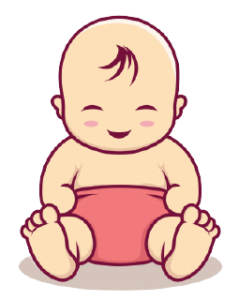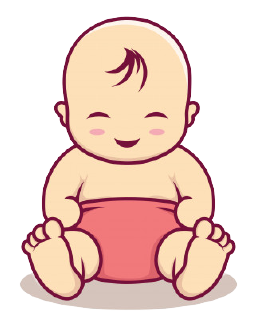The only time that we will enjoy hearing our baby cry is at birth. Their first cry is the blessed message that they have arrived in the world safely after months of growing inside the mommy’s body. From then, every time your baby cries, you will hurry to pick him up and soothe him as soon as possible. Crying is the only way that a baby can communicate their discomforts and needs to the parents so there will be frequent squeals till your baby starts to use words.
No amount of reading and research will prepare you for the nonstop wailing of a newborn. If you feel like grabbing a pair of earplugs while your baby screams at 2 am and nothing can calm him down, you are not a bad parent. Life with a baby is hard and you deserve a peaceful rest. So let us explore the reasons for baby squeals and what you can do to comfort your crying baby.
CONTENT
1. Why won’t my baby stop crying?
2. How to soothe a crying baby?
3. When to be concerned about your baby’s crying?
1. Why won’t my baby stop crying?
Newborns in and below three months of age.
A cry from your baby makes you run towards him worrying if everything is fine with him. But at this age, your baby might cry for anything, even if he is uncomfortable in the position he is at the moment or wakes up suddenly by a loud noise. So in the first few months, a variety of reasons can lead to nonstop crying sessions of a baby.
- Have been overfed
- Not being burped properly
- Surrounding is too cold or too hot
- Need of comfort or love
- Overstimulation due to
- Discomforts from the clothes he is wearing
- Demanding to be rocked or swaddled
- Hunger
- Need to be changed
- Being tired or sleepy
- Loneliness
- An illness or a pain
Your baby might release gas during the crying spells making you think they suffer from intestinal gas. But according to the American Academy of Pediatrics, gas trapped inside the lower intestine does not cause pain and discomfort. So it is not a potential reason for your baby’s inconsolable squeals.
At the midnight, you will not be in a mood to remember and go through all these reasons which could have made your baby cry. You can make a checklist for yourself and use it during the crying spells to figure out the reason and then fix it soon.
After three months of age
At this age, babies have started or get used to a self-soothing technique of their own. Your baby will use the pacifier, his finger, or something like that to soothe himself. But still crying will be their method of communication with you. They will cry when they are hungry, thirsty, needs to be changed, cuddled to feel lonely.
One of the top reasons that make older babies cry for long hours is teething pains. Your baby will get his first tooth between 6 -12 months. The baby will drool more than usual while his gums become soft and swollen.
Use home remedies such as warm or cold wash clothes or solid teething rings to ease the pain of your baby. If the baby continues to cry consult your pediatrician and give your baby an appropriate dose of acetaminophen (Tylenol). Babies who are older than 6 months of age can be given ibuprofen(Advil).

2. How to soothe a crying baby?
Feeding
I know you have tried feeding your baby and it did not work most of the time. Feeding does not work when your baby is too hungry and it is the reason he started to cry in the first place. You should feed your baby before he gets irritated by his hunger.
Look for the cues which say that your baby is hungry. A hungry baby will have closed fists or try to suck on his thumb. If your baby is in your arms, he will search for the nipple. Observe your baby and know his cues. It will make life easier for both you and the baby.
Know the cries of your baby
Does your baby cry in the same tone every time? Obviously, a baby will cry in different pitches and patterns and each of them communicates a specific message. Start studying the types of cries of your baby. It will be like learning a new language but you will get fluent soon.
When you know what your baby’s cry means, you can comfort the baby soon by fixing the cause. This will avoid long spells of crying that exhaust everyone in the house.
You can also study the reasons that make your baby cry. If extended playtimes, exposure to people, and traveling always end in crying spells, it can be a sign that your baby is overstimulated. Maintaining a journal will help you to identify the triggers of your baby’s nonstop wailing sessions.
Try relief methods for colic
If your baby is diagnosed with colic, experiment with different relief methods and see what method comforts your baby the most. Follow massaging techniques which are specified for babies with colic. These massages will help with calming, sleeping, and digestion of your baby. Massages will be a bonding moment between you and your newborn.
These are some other soothing techniques you can use to calm your baby.
- Rock the baby rhythmically in a chair or in your arms
- Swaddle your baby
- Place them in a windup swing
- Give them a warm bath followed by a massage
- Sing to them
If you think your baby is in pain and cannot find a clear reason, check your baby’s hands, feet and genitals for hair wrapped around them. Hair tourniquets can cause pain to your baby. It is always better to consult a doctor immediately before removing the hair wrapped around a finger or genitals.
3. When to be concerned about your baby’s crying?
If your baby is crying nonstop for hours and you feel like the baby is in pain, contact your pediatrician soon. Below are some other signs that you have to seek medical attention soon. Longer sessions of crying can be a result of colic too. Meet a doctor and discuss the symptoms of your baby to confirm whether your baby suffers from colic.
- Your baby is below 3 months of age and has a fever. It is better to consult your doctor even if the fever is not intense.
- The baby suddenly started to cry inconsolably although he has being quiet in the first month of his life with only a few sessions of crying per day. teething can cause sudden cry spells but consult your doctor as it might be a pain from another health problem.
- The baby has a bulging soft spot, is vomiting, or shows a usual lack of movement.
- The baby refuses to drink fluids or drinks very little for more than 8 hours.
- No soothing technique such as feeding, rocking, singing, being still, silent, changing have calmed your baby


